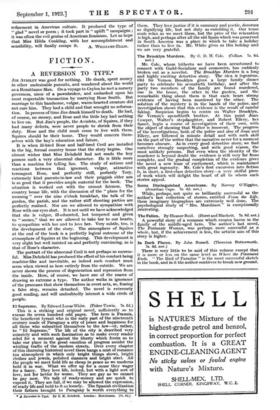FICTION.
■ -•0111■•••
A REVERSION TO TYPE.*
JIM AVIOLET was good for nothing. He drank, spent money in other undesirable pursuits, and wandered about the world
as a Remittance Man. On a voyage to Ceylon he met a nursery governess, niece of a pawnbroker, and embarked upon his most respectable transaction by marrying Rose Smith. But marriage to this handsome, vulgar, warm-hearted creature did not cure him. They had a child and that wrought no reforma- tion. In process of time Jim drank himself to death. He had, of course, no money, and Rose and the little boy had nothing to live on. But Jim's people, the Aviolets, of Squires, if they had many defects, were never people to shrink from their duty. Rose and the child must come to live with them. Squires should be their home. They would concern them- selves with the boy's education and future.
It is when ill-bred Rose and half-bred Cecil are installed in the big, formal country house that the story begins. One almost wishes that Miss Delafield had not made the boy possess such a very abnormal character. He is little more than a machine for telling lies. The study of actions and reactions between that ignorant, vulgar, attractive termagant Rose, and perfectly stiff, perfectly Tory, extremely kind parents-in-law and their priggish elder son is so good that it provides ample material for the book. The situation is worked out with the utmost fairness. The country house life, with the discussion of the "plans for the morning" over the nine o'clock breakfast, the talk of the garden, the parish, and the rather stiff shooting parties are perfectly realized. Nor are we allowed to sympathize with Rose with our eyes shut. It is not until we have acknowledged that she 'is vulgar, ill-educated, hot tempered and given to "scenes," that we are allowed to take her to our hearts, to sympathize with her and to love her. Very subtle, too, is the development of the story. The atmosphere of Squires at the end of the book is a perfectly logical outcome of the atmosphere of Squires at the beginning. This development is very slight but well insisted on and perfectly convincing, as is that of Rose's character.
The portrait of the abnormal Cecil is not perhaps so success- ful. Miss Delafield has produced the effect of his conduct being machine-like and inevitable, as indeed such conduct must seem when viewed as here entirely from the outside. We arc never shown the process of degeneration and repression from the inside. Here, of course, we have one of the snares of drawing so extreme a type. The author walks in ignorance of the processes that show themselves in overt acts, so, fearing a false step, remains detached. The novel is extremely good reading, and will undoubtedly interest a wide circle of people.


































 Previous page
Previous page